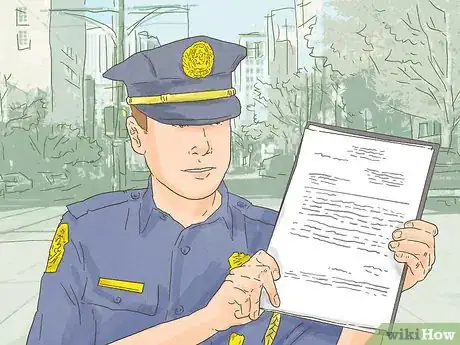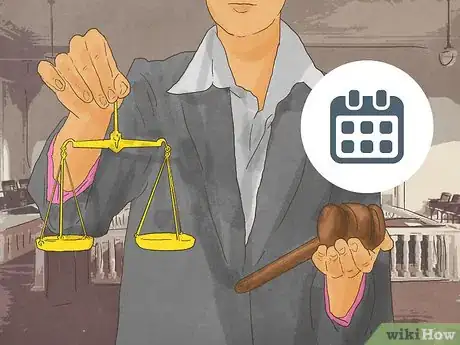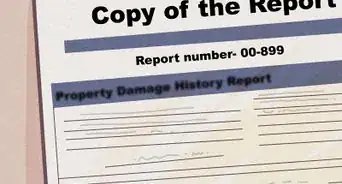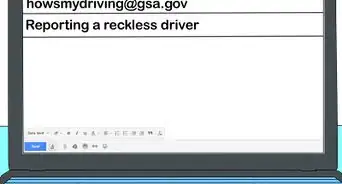This article was co-authored by Saul Jaeger, MS. Saul Jaeger is a Police Officer and Captain of the Mountain View, California Police Department (MVPD). Saul has over 17 years of experience as a patrol officer, field training officer, traffic officer, detective, hostage negotiator, and as the traffic unit’s sergeant and Public Information Officer for the MVPD. At the MVPD, in addition to commanding the Field Operations Division, Saul has also led the Communications Center (dispatch) and the Crisis Negotiation Team. He earned an MS in Emergency Services Management from the California State University, Long Beach in 2008 and a BS in Administration of Justice from the University of Phoenix in 2006. He also earned a Corporate Innovation LEAD Certificate from the Stanford University Graduate School of Business in 2018.
There are 11 references cited in this article, which can be found at the bottom of the page.
This article has been viewed 21,582 times.
When you see or hear criminal activity, you should immediately report it to the police. Write down important information about the crime and criminal. If someone needs medical attention, call an ambulance or emergency services. Depending on the circumstances, you may also have to report the incident to your insurer. Once the police catch the criminal, you should help the prosecution in any way you can, which might include testifying at the trial against the criminal.
Steps
Reporting to the Authorities
-
1Gather information about the crime. As soon as possible, note the important details about the crime so that you can report them accurately to the police:
- day and time the crime was committed
- the location
- the name of the victim
- what happened
-
2Write down information about the suspected criminal. You can help the police find the criminal and get them off the street by providing a description of the criminal. Be as detailed as possible. Note the following:
- height
- weight
- approximate age
- gender
- race
- hair and eye color
- whether the person had a weapon (revolver, handgun, knife, baseball bat, etc.)
- any distinguishing characteristics, such as birthmarks or walking with a limp
- what they were wearing
- what they were driving, including license plate number
- the direction they fled
Advertisement -
3Decide if you want to report anonymously. You might want to report anonymously. For example, you may be afraid of the criminal. If you report anonymously, they can't find out it was you who called.
- However, the police won’t be able to follow up for additional information if you report anonymously.
- Also, you can’t testify against the criminal, which means they might not go to jail.[1]
- Weigh the costs and benefits when you decide. For example, you may be afraid of the criminal but realize how important it is to get them off the street.
-
4Call your local law enforcement. You can report any crime to your local police.[2] [3] Either look up the phone number in your telephone book or call emergency services. In the U.S. and Canada, you can call 911.
- Generally, it is probably easiest to call. However, some cities have websites you can use to report crime.
- You can report anonymously by calling Crimestoppers.[4] Look online for your city's number.
- Ask the police if there is anything else you should do.
-
5Report a crime to other authorities. Depending on the crime, you may want to report to other government agencies. In the U.S., for example, you should report to the following:
- Call the FBI to report bank robberies, terrorism, the sale of counterfeit goods, and destruction of federal property These are often federal crimes, and the federal government will investigate.[5] You can reach the FBI at 1-800-225-5324.
- Report Internet crime to the Internet Crime Complaint Center (IC3). Their website is available here: https://www.ic3.gov/default.aspx.
- Report fraud against a government agency to that agency. For example, you can report Social Security fraud to the Social Security Administration.
Calling Your Insurance Company
-
1Check if your policy covers the damage. Some crimes might harm you financially. For example, someone might have broken into your car or home and stolen property. Alternately, someone could have burned your house down. You should report these crimes to your appropriate insurance company.
- Take out your policy and read what losses are covered. This information may be discussed on the “declarations page,” which comes near the front of your policy.[6]
- If you have a question, call your insurer anyways. They can tell you whether the loss is covered.
-
2Obtain a copy of your police report. Your insurer will want to see that you reported the crime to the police.[7] You should have gotten a copy of the police report when you filed your complaint.
- If not, visit the police department and ask how to get a copy of the report.
- You may be charged a fee for a copy of the police report.
-
3Contact your insurer. You can make a claim over the phone. Don’t delay. They may have a policy that you must report a loss within a certain amount of time.[8] Provide the following information:[9]
- type of loss you suffered
- date of the loss
- location of the damage
- any injuries (such as physical injuries)
- condition of your property
- description of any damaged goods
-
4Work with your claims representative. Your insurer should assign the case to a claims representative, who will analyze your claim and decide what is covered. You should be notified promptly in writing.[10]
- If you disagree with the insurance company’s decision, you should ask about an appeal.
- Also consult with an attorney, who may help you if the insurer has denied you coverage in bad faith.
Testifying in Court
-
1Note the date and time of the trial. The prosecutor should tell you when the trial will be held. You may receive a formal document in the mail requesting your attendance as a witness. Mark the date on your calendar.
- If you can’t make the date, you should tell the prosecutor as soon as possible. They may have to reschedule the trial.
-
2Dress appropriately. The jurors will be judging you as soon as you step into the courtroom. Accordingly, you want to look professional. Court is a conservative place, so remember the following tips:
- Men should ideally wear dress pants (not jeans) and a dress shirt that buttons up. Wear dress shoes (not sneakers) with dark-colored socks.
- Women can wear a blouse with either a skirt or dress pants. They can also wear conservative dresses. Women should wear heels or flats but not sneakers or open-toed sandals.
- Regardless of what you wear, your clothes should be neat.[11] Also avoid loud or flashy jewelry.
-
3Take an oath. You’ll have to take an oath as soon as you get on the witness stand. Say, “I do” in a loud voice.[12] Remember to always tell the truth, regardless of whether the truth helps or hurts the prosecution.
- If you don't tell the truth, then you have committed perjury and could be prosecuted yourself.
-
4Listen closely to the question. You don’t want to answer a question you don’t understand or didn’t hear properly. Repeat the question in your mind before answering.
- If you didn’t understand the question, ask the attorney to repeat or rephrase it. Say, "I'm sorry, I didn't understand the question."
- Also pause before answering. This will give the prosecutor a chance to object to any inappropriate question.
-
5Speak clearly. Don’t answer with a gesture or with noises like “uh huh” or “naw.” Instead, use whole words and sentences. Remember to breathe from your diaphragm so that you will speak loudly and clearly. You want everyone in the courtroom to hear you.[13]
- Sometimes people speak fast when they are nervous. Take a deep breath to steady your nerves.
- Also look at the jury when you speak. They are your primary audience, not the lawyers or the judge.
-
6Avoid guessing. If you don’t know the answer to a question, say, “I don’t know” or “I can’t remember.” However, if the lawyer asks you to provide an estimate, then you can do so.[14]
- For example, a lawyer might ask, “How tall did the suspect look?” Since you didn’t have a tape measure, you’ll have to estimate. It is okay to estimate in that situation.
- If the lawyer asks, “Which direction did the suspect flee?”, don’t guess if you don't know.
-
7Do not talk about your testimony with others. You should limit who you talk about the case with. You’ll talk to the prosecutor and possibly the victim. However, don’t discuss what you saw with anyone other than your closest family.
- Don't talk about your testimony with anyone the day of trial. As you wait to testify, you might be in a room with other witnesses. You shouldn’t talk about the case with them.
- Also don’t talk about the case after testifying.[15] Instead, you can leave for the day and come back to hear the verdict if you want.
Community Q&A
-
QuestionHow do I get a copy of my police report?
 Saul Jaeger, MSSaul Jaeger is a Police Officer and Captain of the Mountain View, California Police Department (MVPD). Saul has over 17 years of experience as a patrol officer, field training officer, traffic officer, detective, hostage negotiator, and as the traffic unit’s sergeant and Public Information Officer for the MVPD. At the MVPD, in addition to commanding the Field Operations Division, Saul has also led the Communications Center (dispatch) and the Crisis Negotiation Team. He earned an MS in Emergency Services Management from the California State University, Long Beach in 2008 and a BS in Administration of Justice from the University of Phoenix in 2006. He also earned a Corporate Innovation LEAD Certificate from the Stanford University Graduate School of Business in 2018.
Saul Jaeger, MSSaul Jaeger is a Police Officer and Captain of the Mountain View, California Police Department (MVPD). Saul has over 17 years of experience as a patrol officer, field training officer, traffic officer, detective, hostage negotiator, and as the traffic unit’s sergeant and Public Information Officer for the MVPD. At the MVPD, in addition to commanding the Field Operations Division, Saul has also led the Communications Center (dispatch) and the Crisis Negotiation Team. He earned an MS in Emergency Services Management from the California State University, Long Beach in 2008 and a BS in Administration of Justice from the University of Phoenix in 2006. He also earned a Corporate Innovation LEAD Certificate from the Stanford University Graduate School of Business in 2018.
Police Captain, Mountain View Police Department If you want to get a copy of your own police report or your insurance agent wants it, just go to your local police department. They can get that for you.
If you want to get a copy of your own police report or your insurance agent wants it, just go to your local police department. They can get that for you. -
QuestionShould I report a potential crime even if I'm not confident an actual crime is occurring?
 Saul Jaeger, MSSaul Jaeger is a Police Officer and Captain of the Mountain View, California Police Department (MVPD). Saul has over 17 years of experience as a patrol officer, field training officer, traffic officer, detective, hostage negotiator, and as the traffic unit’s sergeant and Public Information Officer for the MVPD. At the MVPD, in addition to commanding the Field Operations Division, Saul has also led the Communications Center (dispatch) and the Crisis Negotiation Team. He earned an MS in Emergency Services Management from the California State University, Long Beach in 2008 and a BS in Administration of Justice from the University of Phoenix in 2006. He also earned a Corporate Innovation LEAD Certificate from the Stanford University Graduate School of Business in 2018.
Saul Jaeger, MSSaul Jaeger is a Police Officer and Captain of the Mountain View, California Police Department (MVPD). Saul has over 17 years of experience as a patrol officer, field training officer, traffic officer, detective, hostage negotiator, and as the traffic unit’s sergeant and Public Information Officer for the MVPD. At the MVPD, in addition to commanding the Field Operations Division, Saul has also led the Communications Center (dispatch) and the Crisis Negotiation Team. He earned an MS in Emergency Services Management from the California State University, Long Beach in 2008 and a BS in Administration of Justice from the University of Phoenix in 2006. He also earned a Corporate Innovation LEAD Certificate from the Stanford University Graduate School of Business in 2018.
Police Captain, Mountain View Police Department Yes, you never know what information could be relevant to police and help them stop a possible crime from happening or find a criminal they've been looking for.
Yes, you never know what information could be relevant to police and help them stop a possible crime from happening or find a criminal they've been looking for.
References
- ↑ http://blogs.findlaw.com/blotter/2012/12/should-you-report-a-crime-anonymously.html
- ↑ https://www.usa.gov/report-crime
- ↑ Saul Jaeger, MS. Police Captain, Mountain View Police Department. Expert Interview. 21 February 2020.
- ↑ https://crimestoppers-uk.org/
- ↑ https://www.justice.gov/usam/organization-and-functions-manual-10-partial-list-federal-matters-investigated-fbi
- ↑ http://law.freeadvice.com/insurance_law/insurance_law/fire-insurance-claim-process-review.htm
- ↑ http://realestate.findlaw.com/owning-a-home/top-ten-tips-for-filing-fire-insurance-claims.html
- ↑ http://law.freeadvice.com/insurance_law/insurance_law/fire-insurance-claim-process-review.htm
- ↑ http://realestate.findlaw.com/owning-a-home/top-ten-tips-for-filing-fire-insurance-claims.html
- ↑ http://law.freeadvice.com/insurance_law/insurance_law/fire-insurance-claim-process-review.htm
- ↑ https://www.justice.gov/usao-mdpa/victim-witness-assistance/tips-testifying-court
- ↑ https://www.justice.gov/usao-mdpa/victim-witness-assistance/tips-testifying-court
- ↑ https://www.justice.gov/usao-mdpa/victim-witness-assistance/tips-testifying-court
- ↑ https://www.justice.gov/usao-mdpa/victim-witness-assistance/tips-testifying-court
- ↑ https://www.justice.gov/usao-mdpa/victim-witness-assistance/tips-testifying-court






































































